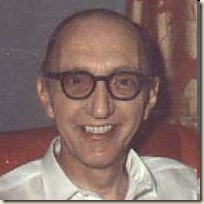In 1950, in an obscure and soon-to-be-almost-forgotten magazine called Fantasy Book, a story appeared with the memorable title "Scanners Live in Vain":
Martel was angry. He did not even adjust his blood away from anger. He stumped across the room by judgment, not sight. When he saw the table hit the floor, and could tell by the expression on Luci's face that the table must have made a loud crash, he looked down to see if his leg was broken. It was not.
This was intriguing stuff back in 1950 (it's still pretty intriguing now) and word of the story got out, talking about a bright new talent in science fiction going by the odd name of Cordwainer Smith. People wondered what his next story would be.
They kept wondering. Fantasy Book folded, and no other magazine seemed to get any stories from Smith. "Scanners" was anthologized and readers looked avidly for more work, but there was none. It was assumed that the name was a pseudonym (who would name their child "Cordwainer" (an archaic word meaning "shoemaker")?), but whose?
Five years later, H.L. Gold, the legendary editor of Galaxy, managed to track down Smith and persuade him to write more. The second story by Smith, "The Game of Rat and Dragon," was even better than the first.
A major new short story writer had arrived. And since science fiction in the 50s (and beyond) was pretty much a short story medium, it meant a major SF writer was discovered.
 Smith's real name was Paul Linebarger. He was a political scientist who taught at Johns Hopkins and an expert on Far Eastern affairs (he was a close friend of Chaing Kai-shek and had Sun Yat-sen as a godfather) and psychological warfare. Some accounts indicated he devised a way for Chinese soldiers to chant "honor," "duty," and "humanity" and the phrases would sound like "I surrender" in English, allowing them to give up while saving face (I checked an online Chinese dictionary, and found that "duty" and "humanity" do come out as "zi-ren-dao," which does sound pretty close to "surrender")
Smith's real name was Paul Linebarger. He was a political scientist who taught at Johns Hopkins and an expert on Far Eastern affairs (he was a close friend of Chaing Kai-shek and had Sun Yat-sen as a godfather) and psychological warfare. Some accounts indicated he devised a way for Chinese soldiers to chant "honor," "duty," and "humanity" and the phrases would sound like "I surrender" in English, allowing them to give up while saving face (I checked an online Chinese dictionary, and found that "duty" and "humanity" do come out as "zi-ren-dao," which does sound pretty close to "surrender")
But he wanted to be a writer, too, and submitted many failed stories until Fantasy Book (which is only known at all because of him) took him on -- and never actually paid him for it.
Smith's stories were generally set in a particular future history, called the Instrumentality of Mankind. There were connections, and a real historic timeline. The world was filled with baroque wonders. The most notable were the underpeople, people created from animal stock and who faced strong prejudices there was stroon, the santaclara drug, which conferred immortality, and which made its producers on the planet Norstrilia (or Old North Australia) very rich indeed.
Smith was a master at portraying a strange, decadent society, and often used Chinese methods of storytelling in his work. He was the master of weird and evocative names and titles, with characters like C'Mell, Dolores Oh, Prince Lovaduck, Lord Jestocost, and many others. Even the story titles are strange and exciting:
- The Crime and Glory of Commander Suzdal (I love the story, though some of its assumptions are highly offensive today).
- Golden the Ship Was -- Oh! Oh! Oh!
- Mother Hittons Litul Kittons (click on link to read)
- The Ballad of Lost C'Mell
- A Planet Called Shayol
Smith's only science fiction novel was Norstrilia, but was made up of two shorter works joined together (he wrote a couple of other in other genres under other pen names). He seemed to have preferred the short story format, and back in the 50s and 60s, that was enough to make a name for yourself.
Alas, Smith died in 1966, with just over ten years of productive work. He never won any SF awards and his work was primarily in magazines and anthologies. Since fewer readers read short stories, they don't see him all that often. Most of his works are in print. If you like weird and wonderful science fiction, the name Cordwainer Smith should be part of your vocabulary.
No comments:
Post a Comment